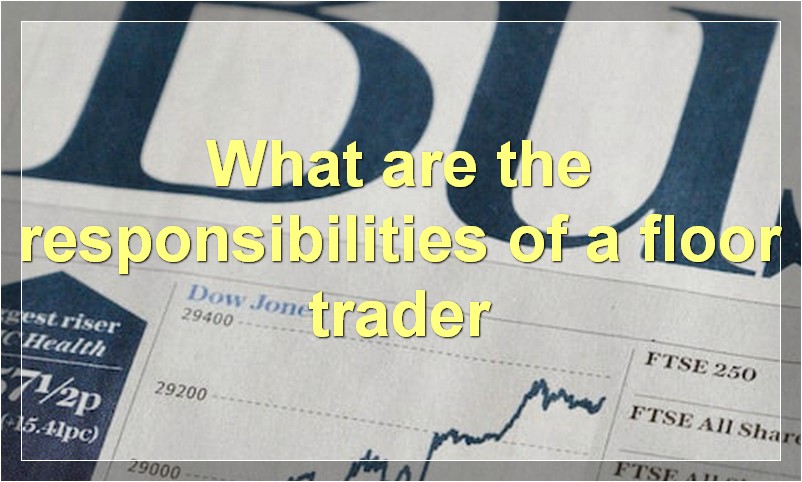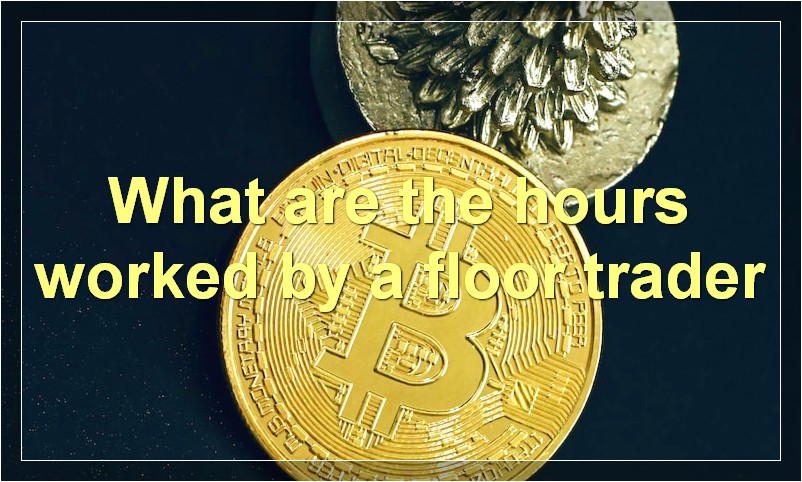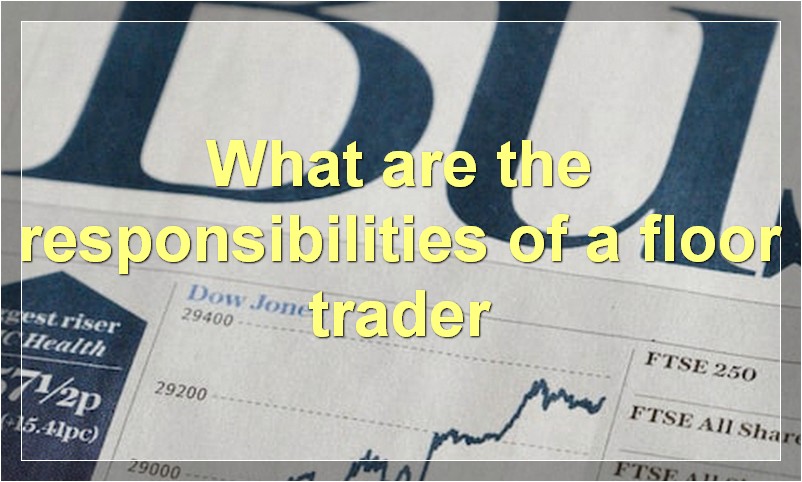In a room full of people who are all trying to outdo each other, the floor trader is the one in charge. As the designated representative of a particular firm or trading entity at an exchange, they are responsible for buying or selling securities and other commodities on that exchange.
What is the job of a floor trader
If you’re interested in a career in finance, you may have considered becoming a floor trader. Floor traders are responsible for executing trades on behalf of their firm or clients in the trading pit of an exchange. While floor trading has declined in recent years with the advent of electronic trading, it can still be a viable career option for those with the right skills and experience. In this article, we’ll take a closer look at what floor traders do and what it takes to be successful in this role.
Floor traders are typically employed by investment banks, brokerages, or trading firms. They are responsible for buying and selling securities on behalf of their firm or clients in the trading pit of an exchange. To do this, floor traders must have a thorough understanding of the market and be able to make split-second decisions. They must also be able to handle the stress of the job, as it can be very high-pressure.
In order to be successful as a floor trader, you will need to have strong communication and math skills. You must also be able to think quickly and make decisions under pressure. If you have these skills and are interested in a career in finance, becoming a floor trader may be the right choice for you.
What are the responsibilities of a floor trader

As a floor trader, you are responsible for executing trades on behalf of your firm or clients. This involves working with other market participants to find the best prices for securities, and then executing trades at those prices. Floor traders must also be able to keep up with the fast pace of the market, as prices can change very quickly.
Floor traders must have a strong understanding of the securities market, as they need to be able to find the best prices for their clients. They must also be able to negotiate with other market participants, in order to get the best possible price for their client. In addition, floor traders must be able to keep up with the fast pace of the market, as prices can change very quickly.
What skills are needed to be a floor trader
A floor trader is a professional who buys and sells securities on the floor of an exchange. Floor traders are also called “local” because they trade for their own account rather than for a firm or institution. To be a successful floor trader, one must have excellent communication and negotiation skills, as well as the ability to make split-second decisions. They must also be able to think on their feet and adapt to changing market conditions. In addition, floor traders must be able to maintain their composure under pressure and have a high tolerance for risk.
How does one become a floor trader
In order to become a floor trader, one must first complete an accredited financial program and then pass the Series 56 exam. After passing the Series 56 exam, one must then complete a floor trader training program.
What is the average salary of a floor trader
The average salary of a floor trader depends on many factors, including experience, position, and location. In the United States, the average salary for a floor trader is approximately $85,000 per year. Salaries can range from $50,000 to over $100,000 per year, depending on these factors. Floor traders typically work in the financial district of large cities and are employed by banks, brokerages, and other financial institutions.
What are the hours worked by a floor trader

As a floor trader, you can expect to work long hours. The trading day begins at 9:30 a.m. and ends at 4:00 p.m., but you will need to be at your desk well before that to prepare for the day’s trading. You can also expect to work some evenings and weekends to keep up with the market.
What is the work environment like for a floor trader
The work environment for a floor trader is very exciting. There is a lot of noise and activity, and it can be very chaotic at times. But it is also a lot of fun. You never know what is going to happen next, and there is always a lot of money to be made.
Floor traders typically work in pairs, so you always have someone to talk to and help you make decisions. And since the job requires quick thinking and fast reflexes, it can be a great workout.
Of course, it is also a very high-pressure job. You are constantly under the gun to make money for your firm, and if you don’t perform, you could be out of a job very quickly. But that just adds to the thrill of it all.
What are the risks associated with being a floor trader
As a floor trader, you are constantly at risk of making bad trades that can cost you a lot of money. You also have to be careful of the other traders on the floor, as they can sometimes be aggressive and try to take advantage of you. Additionally, the hours are long and there is a lot of pressure to perform well.
What are the benefits of being a floor trader
If you’re looking for a high-pressure, fast-paced job in the financial world, then being a floor trader might be the perfect fit for you. Floor traders are responsible for buying and selling securities on behalf of their firm or clients. They make split-second decisions based on changes in the market, and they need to be able to think on their feet.
Being a floor trader can be a very lucrative career. The top traders can earn millions of dollars a year. But it’s not all about the money. Floor traders also get to experience the excitement of the trading floor. It’s a high-adrenaline environment, and you never know what’s going to happen next.
Of course, being a floor trader isn’t for everyone. It’s a demanding job, and it requires long hours. You also need to have a strong stomach, as the markets can be very volatile. But if you’re up for the challenge, then being a floor trader can be a very rewarding experience.
Is there demand for floor traders
With the rise of technology, many floor traders have lost their jobs. However, there is still a demand for these traders in certain markets. Floor traders are responsible for executing trades on behalf of their clients. They also provide liquidity to the market and help to ensure that prices are fair.

